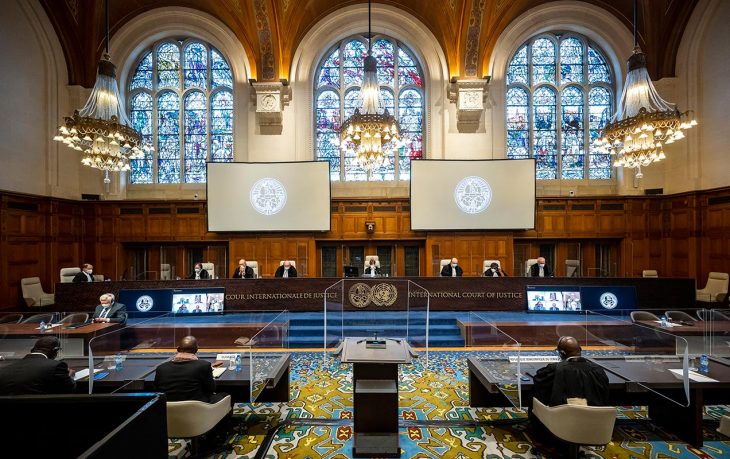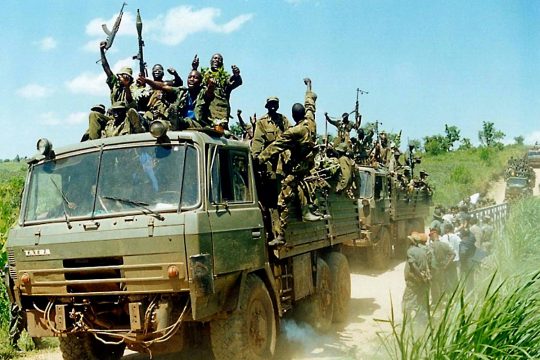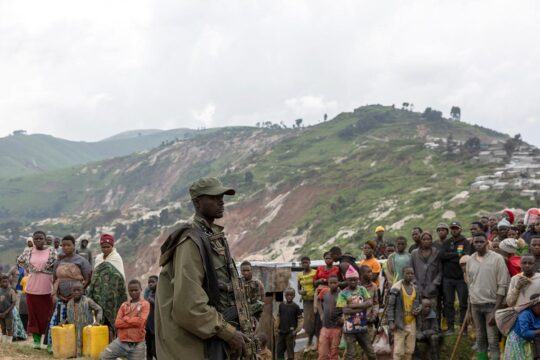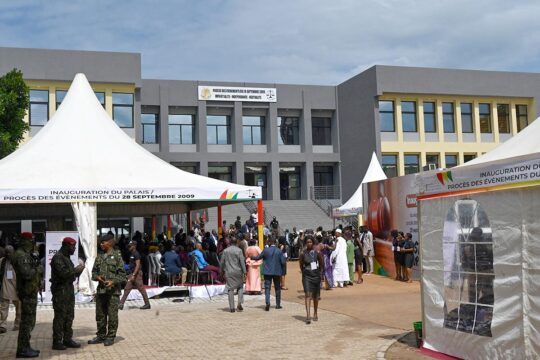It’s “the largest reparation award by an international court for gross violations of human rights and for violations of international humanitarian law,” says Luke Moffett of Queens University in Belfast, Ireland. On 9 February Uganda has been ordered by the International Court of Justice (ICJ), the U.N. top court, to pay 325 million dollars in reparations to the Democratic Republic of Congo (DRC) for its occupation and plundering of Ituri province at the end of the 1990’s. But the sum falls far short of the 11 billion dollars DRC had asked for, and “this was really, really peanuts” as far as victims are concerned, says Pascal Kambale of the Open Society Foundations, an NGO. “We can think that 325 millions sounds huge to you, right? But if we think about it in the context of DRC and the scale of violations, it's a drop in the bucket. It's nothing,” agrees Carla Ferstman of Essex University, in the UK. Uganda, concludes Moffett, “got off quite lightly considering how much damage they caused.”
The war in DRC involved multiple states and has been likened to the second world war in the vastness of its casualties and human rights abuses. Back in 2005 the ICJ ruled that Uganda had violated international law in occupying Ituri, in Eastern DRC, with offences committed by its own troops and other armed groups it supported. That ruling was the primary aim in approaching the ICJ in 1999, says Kambale: “This was not a court where DRC went to seek the damage for victims. It was a court where it went primarily to seek a declaration that what Uganda did was unlawful. And I think we got that”.
The International Criminal Court (ICC) – a court that deals with individual responsibility – has since dealt a few cases of war crimes and recruitment of child soldiers stemming from the conflict, but the 2005 ICJ ruling was “a missing piece of the puzzle”, says Ferstman because “it laid out the state’s responsibility”. Last week’s reparations order is a consequence of that judgment, and while she acknowledges that its size means “we're pulling at straws to see some positive elements here,” she nevertheless says that “one needs to look at least at the small win.”
Lacking a process to find evidence
To understand why the court ruled such a low amount we need to delve a little back into the case’s history. “In 1999, when this request was first prepared, it was prepared by a team of human rights activists, human rights lawyers, none of whom had previous experience or international law exposure,” reminds Kambale. And that period in 1999 “was the apex of the occupation, so they did not have any means to go to Ituri and do proper investigation.”
Mass human rights violations cases are always difficult for courts to deal with, says Moffett, because courts have “evidential thresholds”. Whereas more administrative bodies like commissions and arbitration bodies can work to self-imposed standards and come to more accurate assessments, through a process that includes victims coming forward and the states having to produce the evidence, in this case the court itself appointed experts and sifted through those reports to try to find information. But that evidence was “perceived as weak,” says Ferstman. According to Moffett, the weakness derived from their source material: they were drawn from data from secondary sources and it wasn't corroborated by independent experts or witnesses on the ground. The judges referenced the 2009 UN report mapping report which documented many of the most serious crimes committed by the Ugandan (UPDF) forces. “They didn't appoint any reparation experts, there are no witness interviews,” Moffett points out.
In addition, the ICJ rarely goes into issues of reparation. It does so “very, very infrequently,” explains Ferstman, “because basically the practise of the ICJ is to make a finding on responsibility and then to leave it to the parties to sort things out”. It has taken 17 years between the decision on responsibility and the ruling on reparations. The court “was put in the very uncomfortable position of having to force the parties towards this decision”.
What’s acceptable is what one can afford
The court dismissed several of DRC’s claims including broad compensation for macroeconomic damage, saying a clear link between Uganda’s actions and alleged economic damage had not been proven. The total of the awarded reparations breaks down into $225 million for damages to persons, including the estimated 10,000 to 15,000 deaths attributed to Uganda during the conflict, but also for child soldiers and victims of rape; $40 million for property damage; and another $60 million for damage to the environment and loss of natural resources mined in Ituri.
In the end, says Moffett, “big reparations schemes are [about] what's acceptable to the parties, what's feasible”. In other words, it’s also about what the offending party can afford. “An equitable finding is basically making some kind of an award which doesn't necessarily correspond to the actual harm but is just a global sum to do something in terms of reparations; it’s very limited,” explains Ferstman. Kambale agrees: “In the absolute, the amount is almost nothing compared to the damage that the UPDF did in Ituri alone, in one year alone”. But he acknowledges that “it was difficult for Ugandan budget to support this,” and even the small amounts matters: “The symbolic of it is very, very important”.
The full responsibility of the occupying power
Looking at the salient parts the reparations judgement there are several that stand out. The judges addressed roles played by non-state armed actors that Uganda supported and with whom they occupied and ravaged Ituri. This is “really, really important,” says Kambale because an international court has sanctioned a country for the way they have worked with rebels. Uganda and Rwanda were sanctioned by the United States and the European Union over their support for the M23 rebel group in 2012. “But this takes the whole thing a notch up,” he says. Because “it’s an international court.” “Uganda was the occupying force in Ituri for the period,” notes Ferstman. “Basically [the court is] saying, you're responsible for everything there. In relation to non-state actors, I think it's quite important.”
In fact Ferstman says this ruling has brought “a bit of a sigh of relief” because in a previous genocide case the ICJ had refused to adjudicate that a state had effective control via rebel proxies. (The court did not find that Serbia had effective control via Bosnian Serb proxies and consequently held that Serbia was not liable for damages.) In this case “the court refused to extend those very narrow principles to this broader case where Uganda was found to be responsible not only for failing to prevent the acts of rebels or other groups in DRC, but was actually responsible as occupying power in Ituri. And basically reparations flowed from that responsibility and beyond. That was an important finding.”
Another important detail is the compensation for environment damage. “The ICJ has made rulings on environmental damage before, but not in relation to conflicts,” says Ferstman. “It recognised that as an occupying power in Ituri at least Uganda had obligations to safeguard the environment. It wasn't only about the reparations for environmental harm stemming from international humanitarian law abuses more broadly. That, I think, is new, the positive obligation to protect the environment.”
Furthering peace or the opposite?
Uganda has been ordered to pay the sum in five yearly instalments of $65 million to start in September this year. The judges said they were satisfied the reparations awarded and the terms of payment were “within the capacity of Uganda to pay.” Ferstman says the court could have gone “quite a lot further in identifying principles about how reparations should be implemented. That would have made the judgement much more dynamic, important and forward looking.” DRC has said that any reparations awarded would be put into a fund and distributed fairly to the people that suffered directly from Uganda’s actions. But Uganda has already said it will not pay, and the court has decided that it plays no further role in the case.
Ferstman then wonders whether the judgment may end having the opposite effect by being a further bone of contention between the two sides: “If we consider that an ICJ decision judgement should contribute to conflict resolution in a very fractious region, it might ultimately end up doing the opposite – if the judgement is not enforced.” While Moffett is more concerned that such a court decision fails to deal with the bigger issues: “You've got the largest peacekeeping operation in the world [in Eastern DRC today], and yet you still have got illegal resource exploitation, child soldiers, sexual violence and massacres.”








